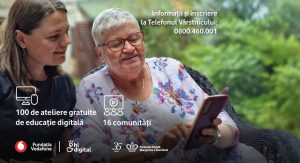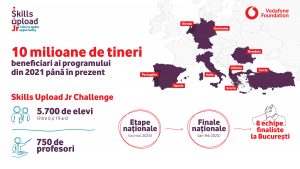“Once upon a time, there was a little girl named Ema. Ema had turned 7 and wanted to become a ballerina when she grew up. One morning, cheerful Ema was doing her stretching with some gymnastics exercises, when all of a sudden, she felt a sharp pain…”.
All the children hospitalized at the Oncology Institute PhD Ion Chiricuță in Cluj-Napoca are familiar with Ema’s story. Just like them, the little girl is going through a sad experience. With the help of the Brave Lion, the symbol of success in the fight against cancer, all ends well.
In the play room provided somewhere on the 4th floor of the Institute, apart from the therapeutic stories, children also get full attention from the specialists and volunteers in the field of psychosocial services.

Here, The children learn about the human body, the environment, geography or history, reinterpreted courses compared to a traditional school. Yet, by far, the hospital visits of the Brave Lion – who has also been through a similar struggle – are true celebrations.
Last week, I got to know one of the little patients of the oncology institute in Cluj. I will refer to him as Paul. He’s 11 and comes from a town in Moldova. He also knows Ema’s story.
“Ema was a little girl who did not want to go to hospital, but she eventually went and befriended the Brave Lion. The Brave Lion is my friend. I like to pull his tail. That’s where his courage is, in his tail”, Paul tells us, and under the mask covering his face you can sense a shy smile.
He then notices the mold on the table, used to get the children acquainted to the organs of the human body. He’s fascinated by the brain.
“Look, this is where they performed surgery on me”, he says, pointing towards the cerebellum in the mold. I notice the almost 10 centimeter long scar on the back of the child’s head.
“The little brain commands the big brain. It’s the big brain that helps you think”, he continues. After the two brain surgeries, he learned to walk and write again.
“This is where we learn that today is the most important day”.
Laura, Oana and Diana are just three of the young people from the Little People Association, which deals with child cancer patients. Doctors tell them that what they do humanizes the medical act.
Oana joined the association as a volunteer, a few years ago.

“The volunteers get involved 100 percent. It’s normal to get involved. If you like what you do, in two hours, there’s not enough time for you to think « oh, poor fella’ » Unfortunately, sometimes we lose children. This is where we learn that today is the most important day”, Oana says.
The mobile app “The Brave Lion”, developed with the financial support of the Vodafone Romania Foundation helps children from the pediatric cancer wards in the country. It is a symbol of success in the fight against cancer and teaches children to have more courage throughout the treatment and to remember that he had also been a Cowardly Lion, in the beginning. With the help of the Little People volunteers, the Brave Lion, together with the little patients, can smilingly say “I am not afraid!”.
Paul is just one of the 1,925 cancer patients aged 0-18 from eight oncology centers in Romania, where specialists and volunteers from the Little People Association work daily, supported by the mobile app “The Brave Lion”, providing access to each child to psychosocial support programs.
Support for customized treatment
The therapeutic games, the scale of pain, the scale of morale, the therapeutic stories designed as integrated elements of the mobile app “The Brave Lion” help the patients improve aspects related to self-esteem, awareness regarding the human body, positive thinking, identifying more efficient ways to handle the disease, sending information regarding the level of pain or the experienced emotional state.

The data obtained from the use of the app provides extremely useful information to the specialists from the Little People Association regarding the challenges faced by the patient during the treatment. This allows the customization of therapeutic activities and implicitly increases their efficiency, so that children and teenagers battling cancer can get more information about the experience of the disease, understand and accept the necessity of the treatment.
Support for children battling cancer
The mobile app “The Brave Lion” has four therapeutic games. Children can either play them in hospital or at home, on their phone. After filling in an evaluation survey, they receive a user name and a password.
One of the games improves their self-esteem. Children can take pictures of themselves and apply wigs, bandanas, hair clips, various accessories to enhance their looks.
Another game helps when they want to relax or when they are angry, because frequently, the treatment makes children very angry. This is a side effect of the treatment. The game is called balloon popping, first slower and then increasingly frequent and fast. This is how they relax.

There is another game, teaching children to focus on the positive. Faces of the Brave Lion are displayed, some of them sad, others, joyful, and the children tap on the happy faces. This encourages them to focus on the positive aspects alone.
In another mobile game, the child learns the functions of the organs in the human body. How do we breathe–this is one of the questions, and he or she must select an organ. This also helps them to be able to show where their pain is located, which, in return, helps doctors provide better treatment for them.
“I remember about the case of a little girl who had a relapse and went through a hand amputation surgery. I visited her in hospital with the app. As soon as she was out of the surgery, she played with the Brave Lion on her phone”, recalls the psychologist Laura Răducan, representative of the Little People Romania Association.
Happy ends: Temerarii (“the Daredevils”)
There are however happy endings. The greatest satisfaction for the members of Little People is to see a child finishing the treatment and cured. “This is proof that there is survival”, Laura Răducan claims.
A success story is when the teenager registers and joins the community of the Daredevils–the community of young cancer survivors in Romania. It began in 2006, in Cluj, with two young people, and currently counts 400 members from 123 Romanian localities.
“The Daredevils are our success stories. These are the stories we tell the children in the hospital. Some of them are members of the volunteer teams”, adds her colleague and friend, Oana Rusu.
Two events are organized each year for the Daredevils. “At the most recent Christmas Gala, I encountered my first Daredevil. Every day, while in the hospital, he said he wanted to go home, that he cannot do this anymore, that he gives up. At the gala, I saw him dancing, happy”, Diana recalls; she works every day with children with cancer at the Oncology Institute of Cluj-Napoca.
The Daredevils’ Community is a true example of success for current patients and is one of the most active communities of its kind in Europe.
Furthermore, many of the Daredevils are willing to come to the hospital as volunteers, because they know how important receiving such support would have been to them, while they were hospitalized.
“For a parent, seeing one cancer survivor is enough. It’s one thing for me to tell the parent that «I will work with your child and perform interventions» and another to say: «Here he/she is (the survivor), he/she is here, so you can see this». There are cases where the parents tell us that their child has leukemia, and we bring a survivor who has had the same diagnostic”, Oana says.
Some survivors do not wish to return to the hospital as volunteers. There’s no pressure. But once a cancer patient, one’s always a patient.
Employer, to cancer survivor: “How do you know you’re alright? Should I invest in you? Would you die in two years or not?”
Returning to everyday life, after months of battling cancer, is a real challenge. Society is not ready to welcome back a cancer survivor. How to find a friend, how to return to school, should one write in the Resume about having cancer or not? Does he/she wish to reveal the cancer diagnostic or not? What healthcare insurance should be accessed?
“You know, in Romania, there are parents who attended a parent meeting at school to make a decision whether the child can return to the class, because other children might get cancer?!”, Oana claims.
Society is insufficiently informed and educated to be able to receive young people who have beaten cancer, the specialists claim.
“For you, as a specialist involved in working with children, this is heartbreaking! You taught that child to think healthily, you reintegrated him/her, he/she knows exactly where he/she stands, you know that he/she left the ward psychologically sound. And then he/she returns to school and parents organize a meeting to determine whether he/she should return to school, because their children might get cancer”, Oana manifests her outrage towards the stigma of the cancer survivor within the society.
Unfortunately, many employers are skeptical when it comes to recruit a cancer survivor.
“The employers want to know: are you worth the investment? Will you die in two years or not?! That’s exactly how it sounds! That’s exactly how they address the question! Are you sure you’re fine? Why do you still get checked if you say you’re cured? Will you be requesting medical leave? How many times a year would you request medical leave?”, Oana enumerates some of the challenges faced by the winners of the battle with the disease, once they return to their daily lives.
The Little People Association is involved in organizing lobby seminars, where the Daredevils learn their rights, how they should represent themselves, how they can have a voice.
The funding provided by the Vodafone Romania Foundation for the project including the app “The Brave Lion” is in the amount of EUR 70,000 and represents a follow-up of the collaboration with the Little People Association, initiated in 2011 with the program “From diagnostic to survival”.



